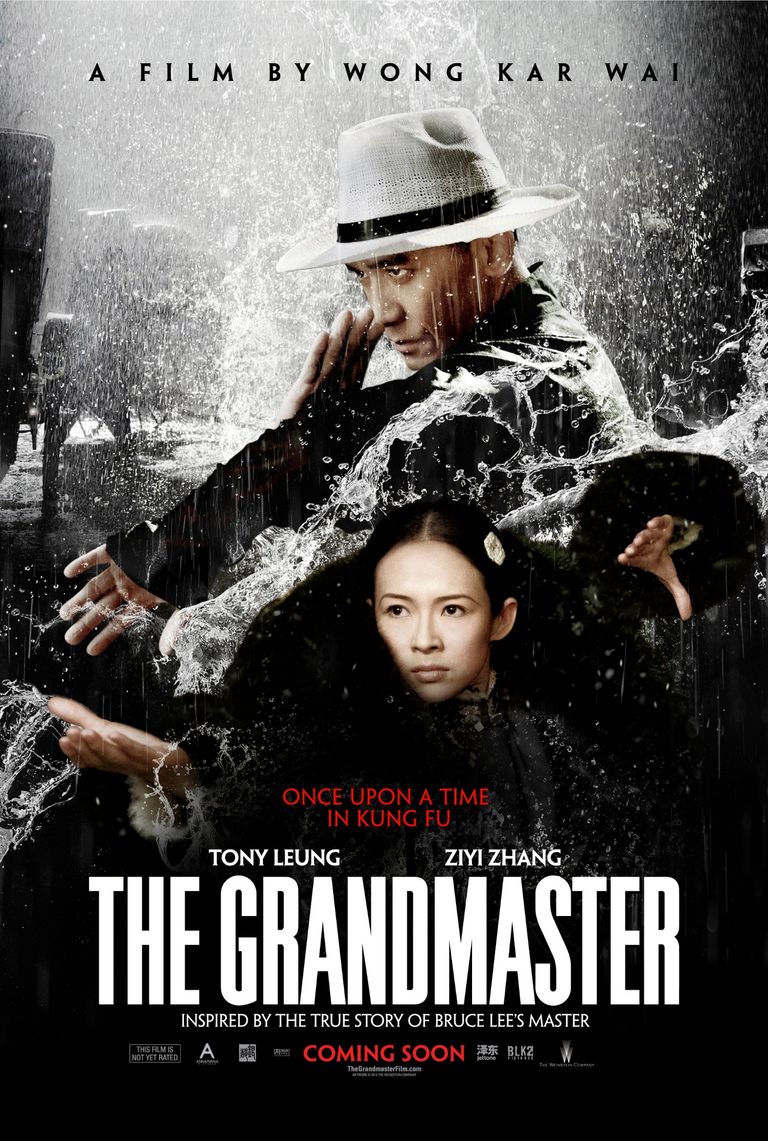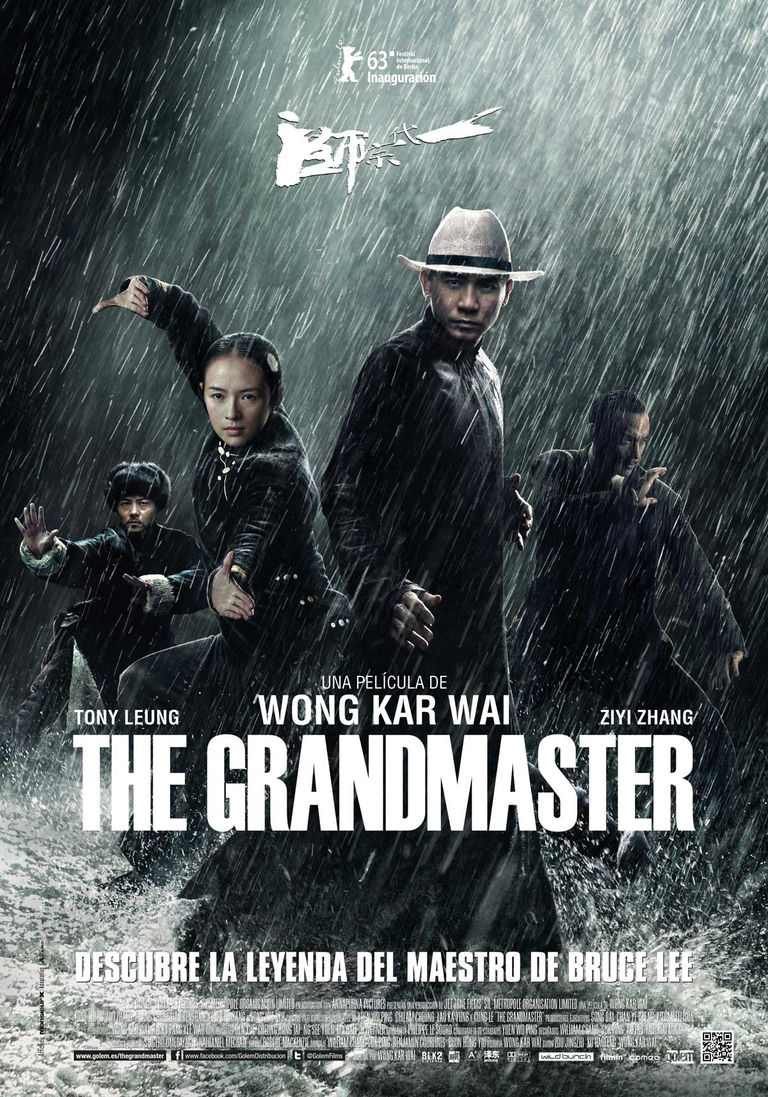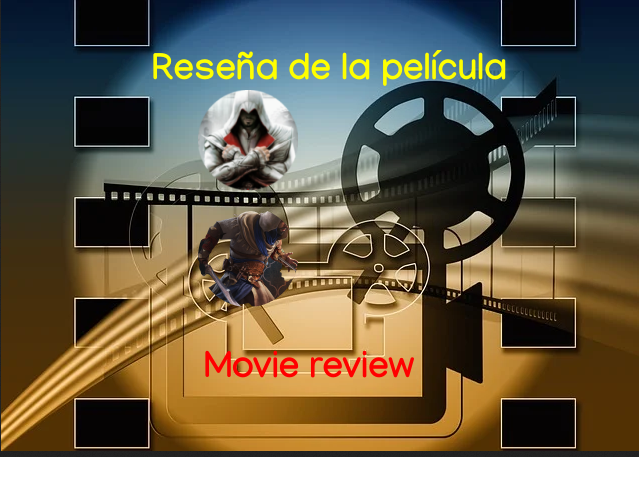
The Grandmaster is more of a biography than a film, in which violence is expressed through art.
The Grandmaster (Yut doi jung si) is a 2013 film written and directed by Wong Kar-wai and starring Tony Leung and Zhang Ziyi.

El gran maestro (Yut doi jung si) es una película de 2013 escrita y dirigida por Wong Kar-wai y protagonizada por Tony Leung y Zhang Ziyi.
Está basada en la vida de Yip Man, maestro de artes marciales Wing Chun y mentor de Bruce Lee.

It is based on the life of Yip Man, Wing Chun martial arts master and mentor to Bruce Lee.
Of the first version, never screened in public and presumed to be around 4 hours long, there are three different edits: the Chinese version of 130 minutes, the European version of 122 minutes previewed at the Berlin Film Festival, and the American version, distributed by Miramax, of 108 minutes.
The European version, also seen in Italy, differs from the original mainly in the second part. In fact, a long night-time dialogue between the protagonist and old Jiang has been omitted, which deals with the sad fate that befell Gong Er. On the other hand, there is a substantial flashback in which Gong Er remembers herself as a child, in winter, secretly admiring her father's Kung-fu exercises and immediately afterwards, on the threshold of her twenties, while she personally practices the sacred art. In the European version, there is also mention of a second meeting (after a first on the train) between Gong Er and "the razor", even if it is not made clear whether the two have a real conversation or begin some kind of relationship. The ending is also different: the Chinese version ends with images of Buddhist statues, while the European version ends with a black and white photograph of Yip Man in the company of his students, and then reopens, with the credits already rolling, with a short segment in which he looks into the camera and asks the audience a question.
The film retraces some moments of Yip Man's life, leaving many others intentionally ellipsised. Much space is also given to the characters of:
Gong Yutian, an elderly master from the North who is responsible for the meeting of different schools and styles, and who is now about to retire;
Gong Er, his daughter, the sole heir of the "64 hands" technique;
Ma San, an ungrateful and ambitious student, who will kill his own master;
Yixiantian, known as "the razor", a nationalist spy and sworn enemy of the puppet government created by the Japanese invaders.
At the center of the film are two main clashes: the one between Yip Man and Gong Er, inside a luxurious brothel, which ends with a substantial equality while at the same time causing a feeling of love to blossom between the two (which never turned into a relationship), and the one between Gong Er and Ma San, which takes place at a train station and ends with the latter being injured and humiliated. In the last part we learn the fate of the protagonists: Gong Er dies of illness after having dedicated his whole life to the cause of martial arts in honor of his father, while Yip Man moves to Hong Kong where he contributes to the spread of Wing Chun.

De la primera versión, nunca proyectada en público y que probablemente durará unas 4 horas, hay tres montajes diferentes: la versión china de 130 minutos, la europea de 122 minutos vista en preestreno en el Festival de Cine de Berlín y la americana, distribuida por Miramax. , 108 minutos.
La versión europea, vista también en Italia, se diferencia de la original sobre todo en la segunda parte. De hecho, se omitió un largo diálogo nocturno entre el protagonista y el viejo Jiang que trata sobre el triste destino de Gong Er. Por otro lado, hay un flashback sustancial en el que Gong Er se recuerda a sí misma cuando era niña, en invierno, decidida a admirar en secreto los ejercicios de Kung-fu de su padre e inmediatamente después, a los veinte años, practicando el arte sagrado. En la versión europea también se menciona un segundo encuentro (tras un primero en el tren) entre Gong Er y "la navaja", aunque no queda claro si los dos mantienen una conversación real o inician alguna relación. El final también es diferente: la versión china termina con imágenes de estatuas budistas, mientras que la europea termina con una fotografía en blanco y negro de Yip Man en compañía de sus alumnos, para luego reabrirse, cuando ya han comenzado los créditos, con una segmento corto en el que mira a la cámara y hace una pregunta al público.
La película recorre algunos momentos de la vida de Yip Man, dejando deliberadamente muchos otros en puntos suspensivos. También se da mucho espacio a los personajes de:
Gong Yutian, un anciano maestro del Norte que fue responsable del encuentro entre diferentes escuelas y diferentes estilos, y que ahora está a punto de jubilarse;
Gong Er, su hija, única heredera de la técnica de las "64 manos";
Pero San, un alumno desagradecido y ambicioso, que matará a su maestro;
Yixiantian conocido como "la navaja", un espía nacionalista y enemigo jurado del gobierno títere buscado por los invasores japoneses.
En el centro de la película hay dos enfrentamientos principales: el de Yip Man y Gong Er, dentro de un lujoso burdel, que termina con una igualdad sustancial y al mismo tiempo hace florecer entre los dos un sentimiento de amor (nunca transformado). en una relación), y el de Gong Er y Ma San, que transcurre en una estación de tren y que termina con la herida y humillación de este último. En la última parte se conoce el destino de los protagonistas: Gong Er muere de enfermedad después de haber dedicado toda su vida a la causa de las artes marciales en honor a su padre, mientras Yip Man se traslada a Hong Kong donde contribuye a la difusión de Wing Chun.

Tony Leung: Yip Man
Zhang Ziyi: Gong Er
Cung Le: Tiexieqi
Song Hye-kyo: Cheung Wing-sing
Chang Chen: Razor Yixiantian
Julian Cheung:
Zhao Benshan: Ding Lianshan
Leung Siu-lung:
Wang Qingxiang: Gong Yutian
Zhang Jin: Ma San
Shang Tielong: Jiang

The figure of Ip Man has already been tackled by cinema, even with good results, as in the case of Wilson Yip's films, who is building a sort of saga around the Master. However, it has always remained within the scope of a highly fictionalized biography in which fighting prevailed over any other option. Wong Kar Wai (after 8 years of preparation, the start of filming in 2009 and the completion of post-production at the beginning of 2013) instead finds in this story an opportunity to summarize his own way of making cinema. His films elevate to the highest power the play of light and shadow that runs through existences both on a formal level and on that of the events brought to the screen. The pleasure (sometimes of an aestheticism that is a bit of an end in itself) that pervades every single shot now finds in the gestures of martial art a universe to explore in which violence is expressed through art, an art that is the fruit of a long apprenticeship. The choice of Yuen Wo Ping (The Matrix, Kill Bill, among others) as fight choreographer highlights how much attention had to be paid to the musicality of the movement.
On the narrative level, the story of Ip Man and Gong Er adapts perfectly to that universe of relationships between the sexes that has always fascinated the director. It is the 'impossible' stories that attract him. Stories in which the impediment dominates, in which love is incandescent but forced by the protagonists themselves to smoulder under a layer of ash that suffocates it without extinguishing it. Thus the rough but colorful surface that opens the film is progressively darkened until it becomes a magma in which darkness dominates in the finale. Because if in kung fu, as Ip Man said, "there are only two words: horizontal and vertical. Make a horizontal mistake. You are the last one standing and you win", in love there are countless variations with respect to these two extremes. The protagonists of Wong Kar Wai's cinema suffer existentially from their presence, sometimes losing themselves in order to find themselves again and sometimes finding themselves again in order to then lose themselves in a restlessness that is never completely dormant.

La figura de Ip Man ya ha sido abordada por el cine, incluso con buenos resultados, como en el caso de las películas de Wilson Yip, que está construyendo una especie de saga sobre el Maestro. Sin embargo, siempre nos mantuvimos dentro del contexto de la biografía altamente ficticia en la que la lucha prevalecía sobre cualquier otra opción. Wong Kar Wai (después de 8 años de preparación, el inicio del rodaje en 2009 y la finalización de la postproducción a principios de 2013) encuentra en cambio en esta historia una oportunidad para sintetizar su propia manera de hacer cine. Sus películas elevan al enésimo grado el juego de luces y sombras que recorre las existencias tanto a nivel formal como de los acontecimientos llevados a la pantalla. El placer (a veces de un esteticismo como fin en sí mismo) que impregna cada plano encuentra ahora en los gestos del arte marcial un universo para explorar en el que la violencia se expresa a través del arte, un arte que es fruto de un largo aprendizaje. Haber elegido a Yuen Wo Ping (Matrix, Kill Bill, entre otros) como coreógrafo de lucha resalta cuánta atención se debe prestar a la musicalidad del movimiento.
En términos narrativos, la historia de Ip Man y Gong Er se adapta perfectamente a ese universo de relaciones entre sexos que siempre ha fascinado al director. Son las historias "imposibles" las que le atraen. Historias en las que domina el obstáculo, en las que el amor es incandescente pero obligado por los propios protagonistas a arder bajo una capa de ceniza que lo asfixia sin apagarlo. Así, la superficie rugosa pero colorida que abre la película se oscurece progresivamente hasta convertirse en un magma en el que domina la oscuridad al final. Porque si en el kung fu, como decía Ip Man, "sólo hay dos palabras: horizontal y vertical. Cometes un error horizontal. Eres el último en pie y ganas", en el amor existen innumerables variaciones respecto a estos dos extremos. . Los protagonistas del cine de Wong Kar Wai sufren existencialmente por su presencia, a veces perdiéndose para encontrarse a sí mismos y a veces encontrándose y luego perdiéndose en una inquietud que nunca ha amainado del todo.



Sources / Fuentes:
Screenshots / Capturas de pantallas : IMDB.
Divider text / Separadores de texto: PNGtree
Final banner of the post / Banner final del post: Pixabay.
Links to my websites / Los enlaces de mis sitios web :

Upvoted. Thank You for sending some of your rewards to @null. Get more BLURT:
@ mariuszkarowski/how-to-get-automatic-upvote-from-my-accounts@ blurtbooster/blurt-booster-introduction-rules-and-guidelines-1699999662965@ nalexadre/blurt-nexus-creating-an-affiliate-account-1700008765859@ kryptodenno - win BLURT POWER delegationNote: This bot will not vote on AI-generated content
Thanks @ctime.